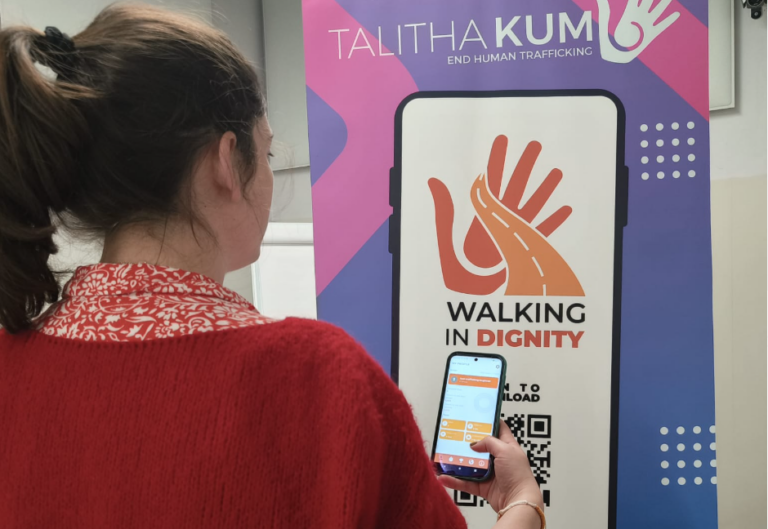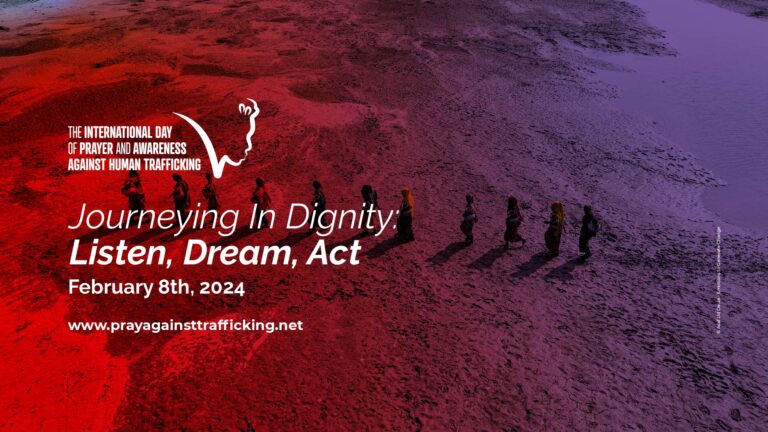By Marta Guglielmetti, Executive Director, Global Solidarity Fund
Today, the thoughts of people of goodwill everywhere are with the suffering people of Ukraine. We join the calls for an end to this conflict and for the humanitarian needs of the Ukrainian people to be met.
With the people of Ukraine in our hearts – those still inside the country and the millions who are escaping from the war – today we will mark the latest step forward for the Global Solidarity Fund’s Innovation Lab on Job Creation for Migrants and Refugees.
Launched in July 2021, we have held three Innovation Lab gatherings with our fellow convening partners – Tent Partnership for Refugees and Goal 17 Partners. This week’s session will be the first of three important steps we will take together over the coming months: three collaboration sessions in March, April, and May focused on actionable, scalable solutions.
For those new to the Innovation Lab project, this project originated from the Global Solidarity Fund’s commitment to creating opportunities for the most vulnerable. In our world today, many migrants, refugees, and internally displaced persons are among those most in need of support as they experience conflict, lack of economic opportunity, and displacement caused by climate change. By creating opportunities where people are, we can help them avoid dangerous migratory journeys.
Partnering is a powerful tool to meet these needs. Businesses play a key role in these collaborations because they can provide skills training and employment to migrants. Faith-based groups are also vital since they have established relationships with migrants through effective programs. Working together, the business sector can help faith-based groups scale up their existing programs to meet the massive need.
Our first meetings in July and October 2021 demonstrated the interest of private sector leaders in working with faith-based organizations to solve issues affecting migrants and produce positive social impact. This interest was again confirmed by the extraordinary private sector participation in our latest gathering, on January 27:
- Abt Associates
- Amazon Web Services
- Aon
- Correlation One
- DHL
- IRI Worldwide
- iWorker
- ManpowerGroup
- NaTakallam
- Salesforce
- Sodexo
- Unilever
In partnership with these companies, faith-based organizations identified the bottlenecks they face in scaling up their existing programs, and private sector leaders provided input on potential approaches to address these issues. Leaders of Catholic congregations – such as the Scalabrians, Salesian Sisters, and Jesuit Refugee Services – working closely with migrants in countries like Ethiopia and Colombia shared their experiences, deepening participants’ understanding of the challenges and potential solutions.
Three main areas of focus were discussed.
- How to provide and engage scalable technology platforms and tools for refugees and migrants
Many congregations have strong programs for job creation and placement and have achieved impressive results. They, however, often lack the tech platforms that would enable them to fully engage their global membership or to link them with other congregations with similar programs.
Examples of the kinds of business best practices that could make a difference, if applied by congregations at scale, were shared. For example, iWorker has developed a technology platform for migrants in Latin America to apply for remote job opportunities – which can enable them to take advantage of the dramatic growth in remote work opportunities driven by the pandemic. Another example is a collaboration in Mexico between a Catholic congregation and Axity, a technology company. They co-created a tool to map the supply and demand for jobs – a tool that could be broadened to include additional geographies.
- Expanding opportunities for migrants and refugees to develop critical business skills
A second bottleneck identified by the faith-based organizations is around skills training for migrants and refugees. The congregations’ training programs are effective, but they could benefit from private sector guidance – specifically, on current and future skills needed by migrants in local and global job markets.
DHL shared an exciting example of this training model. They created a three-month internship program that includes on-the-job and classroom training and imparts eight key skills needed to perform any job well. This program’s goal for participants is either full-time employment with DHL or upskilling so migrants can work in other companies or as entrepreneurs. Tent Partnership for Refugees described a second compelling example, in which a large tech company provided training courses for refugees on its software program. Volunteers mentor trainees in both soft and technical skills, and the company leverages its network to arrange internships for the refugees with its clients and partners. 80% of participants have found jobs after the internships.
- Advocacy: bringing visibility to the migrant and refugee experience in pursuit of change
A third bottleneck congregations experience is government policies that limit their ability to connect migrants with jobs. In some cases, faith organizations have partnered with companies to address these issues, but there is a need for best practices from this work to be replicated more widely.
One congregation described an example of an effective solution through collaboration with Carrefour in Brazil to show municipalities and governments the benefits of migrants in the country. Carrefour developed an innovative process for integrating migrants and refugees into the company, and with the congregation, they identified issues with the legal framework of the country and developed a tool to engage government around solutions. Another example involves Unilever. Through its Ben & Jerry’s brand, Unilever partnered with the International Rescue Committee on a project to help refugees to get to work permits in eight countries. Building on this project, the company launched an Ice Academy to provide refugees with access to training, mentoring, and part-time employment.
In our January discussion, Innovation Lab participants went through a creative exercise to find “out of the box” partnership ideas, identifying new approaches to help solve each problem. Based on these ideas, we used a collective screening process to determine which approaches to pursue. It was encouraging to hear the creative ideas rooted in participants’ core strengths to solve these bottlenecks. Even more exciting was the great enthusiasm and desire to build on successful examples and best practices and create solutions together.
This week will mark the first of three collaboration sessions focused on each of the three areas to create concrete, practical solutions by integrating people from different domains into new systems for job creation.
On March 9 we will focus on Technology Platforms, Skills and Solutions. After that, the next sessions we are planning will be:
- Business Skills: Tuesday, April 12, 2022
- Advocacy/visibility: Thursday, May 5, 2022
It is not too late to get involved in the Innovation Lab! If your company has interest in participating, please get in touch – let’s see what we can accomplish together.




